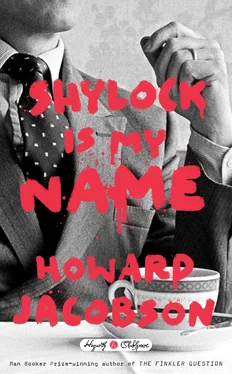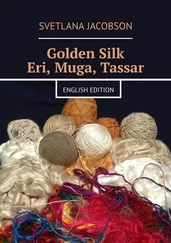Howard Jacobson
Shylock Is My Name
To the memory of Wilbur Sanders
How it is, that over many years of friendship and teaching Shakespeare together we never discussed The Merchant of Venice, I cannot explain. It is a matter of deep regret to me that we cannot discuss it now.
PORTIA: Which is the merchant here, and which the Jew?
DUKE: Antonio and old Shylock, both stand forth.
PORTIA: Is your name Shylock?
SHYLOCK: Shylock is my name.
It is one of those better-to-be-dead-than-alive days you get in the north of England in February, the space between the land and sky a mere letter box of squeezed light, the sky itself unfathomably banal. A stage unsuited to tragedy, even here where the dead lie quietly. There are two men in the cemetery, occupied in duties of the heart. They don’t look up. In these parts you must wage war against the weather if you don’t want farce to claim you.
Signs of just such a struggle are etched on the face of the first of the mourners, a man of middle age and uncertain bearing, who sometimes walks with his head held arrogantly high, and at others stoops as though hoping not to be seen. His mouth, too, is twitchy and misleading, his lips one moment twisted into a sneer, the next fallen softly open, as vulnerable to bruising as summer fruit. He is Simon Strulovitch — a rich, furious, easily hurt philanthropist with on-again off-again enthusiasms, a distinguished collection of twentieth-century Anglo-Jewish art and old Bibles, a passion for Shakespeare (whose genius and swashbuckling Sephardi looks he once thought could only be explained by the playwright’s ancestors having changed their name from Shapiro, but now he isn’t sure), honorary doctorates from universities in London, Manchester and Tel Aviv (the one from Tel Aviv is something else he isn’t sure about) and a daughter going off the rails. He is here to inspect the stone that has recently been erected at the head of his mother’s grave, now that the twelve months of mourning for her has elapsed. He hasn’t mourned her conscientiously during that period — too busy buying and lending art, too busy with his foundations and endowments, or “benefacting,” as his mother called it with a mixture of pride and concern (she didn’t want him killing himself giving money away), too busy settling scores in his head, too busy with his daughter — but he intends to make amends. There is always time to be a better son.
Or a better father. Could it be that it’s his daughter he’s really getting ready to mourn? These things run in families. His father had briefly mourned him. “ You are dead to me! ” And why? Because of his bride’s religion. Yet his father wasn’t in the slightest bit religious.
“Better you were dead at my feet…”
Would that really have been better?
We can’t get enough of dying, he thinks, shuffling between the unheralded headstones. “We”—an idea of belonging to which he sometimes subscribes and sometimes doesn’t. We arrive, lucky to be alive, carrying our belongings on a stick, and immediately look for somewhere to bury the children who betray us.
Perhaps because of all the anger that precedes all the burying, the place lacks the consolation of beauty. In his student days, when there was no word “we” in his vocabulary, Strulovitch wrote a paper on Stanley Spencer’s The Resurrection, Cookham, admiring the tumult of Spencer’s graves, bulging with eager life, the dead in a hurry for what comes next. But this isn’t a country churchyard in Berkshire; this is a cemetery of the Messiahless in Gatley, South Manchester, where there is no next. It all finishes here.
There is a lingering of snow on the ground, turning a dirty black where it nestles into the granite of the graves. It will be there until early summer, if summer ever comes.
The second person, here long before Strulovitch arrived, tenderly addressing the occupant of a grave whose headstone is worn to nothing, is Shylock, also an infuriated and tempestuous Jew, though his fury tends more to the sardonic than the mercurial, and the tempest subsides when he is able to enjoy the company of his wife Leah, buried deep beneath the snow. He is less divided in himself than Strulovitch but, perhaps for that very reason, more divisive. No two people feel the same about him. Even those who unreservedly despise him, despise him with different degrees of unreservation. He has money worries that Strulovitch doesn’t, collects neither art nor Bibles, and finds it difficult to be charitable where people are not charitable to him, which some would say takes something from the soul of charity. About his daughter, the least said the better.
He is not an occasional mourner like Strulovitch. He cannot leave and think of something else. Because he is not a forgetful or a forgiving man, there never was or will be something else.
Strulovitch, pausing in his reflections, feels Shylock’s presence before he sees him — a blow to the back of the neck, as though someone in the cemetery has been irreverent enough to throw a snowball.
The words “My dearest Leah,” dropped like blessings into the icy grave, reach Strulovitch’s ears. There will be many Leahs here. Strulovitch’s mother was a Leah. But this Leah attracts an imperishable piteousness to her name that is unmistakable to Strulovitch, student of husbandly sorrow and fatherly wrath. Leah who bought Shylock a courtship ring. Leah, mother to Jessica who stole that ring to buy a monkey. Jessica the pattern of perfidy. Not for a wilderness of monkeys would Shylock have parted with that ring.
Strulovitch neither.
So “we” does mean something to Strulovitch after all. The faith Jessica violates is his faith.
Such, anyway, are the only clues to recognition Strulovitch needs. He is hard-headed about it. Of course Shylock is here, among the dead. When hasn’t he been?
—
Eleven years old, precociously moustached, too clever by half, he was shopping with his mother in a department store when she saw Hitler buying aftershave.
“Quick, Simon!” she ordered him. “Run and get a policeman, I’ll stay here and make sure he doesn’t get away.”
But no policeman would believe that Hitler was in the store and eventually he escaped Strulovitch’s mother’s scrutiny.
Strulovitch hadn’t believed that Hitler was in the store either. Back home he made a joke of it to his father.
“Don’t cheek your mother,” his father told him. “If she said she saw Hitler, she saw Hitler. Your Aunty Annie ran into Stalin on Stockport market last year, and when I was your age I saw Moses rowing on Heaton Park Lake.”
“Couldn’t have been,” Strulovitch said. “Moses would just have parted the waters.”
For which smart remark he was sent to his room.
“Unless it was Noah,” Strulovitch shouted from the top of the stairs.
“And for that,” his father said, “you’re not getting anything to eat.”
Later, his mother sneaked a sandwich up to him, as Rebekah would have done for Jacob.
The older Strulovitch understands the Jewish imagination better — why it sets no limits to chronology or topography, why it cannot ever trust the past to the past, and why his mother probably did see Hitler. He is no Talmudist but he occasionally reads a page in a small, private-press anthology of the best bits. The thing about the Talmud is that it allows a bolshie contrarian like him to argue face to face with other bolshie contrarians long dead.
You think what , Rabbah bar Nahmani? Well fuck you!
So is there a hereafter after all? What’s your view, Rabbi?
To Strulovitch, Rabbah bar Nahmani, shaking off his cerements, gives the finger back.
Читать дальше












